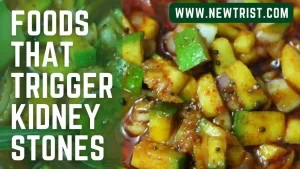The kidney stones diet includes avocado, broccoli, cantaloupe, corn, cucumber, oats, olive oil, orange, pears, pineapple, radishes, rice, and wheat grass.
|
Morning Drink |
Tulsi drink (1 glass) |
|
Breakfast |
Bajra roti (2) + Lauki methi curry (1/2 cup) + a slice of melon |
|
Soup |
Banana stem barley soup (1 cup) |
|
Salad |
Crunchy apple salad (1 cup) |
|
Lunch |
1 cup rice + 2 roti + ½ cup bhindi curry + ½ cup capsicum sabzi |
|
Evening Snack |
Green tea (1 glass) + ½ cup poha |
|
Dinner |
Stuffed chapati (2) with vegetables + ½ cup low-fat curd |
Best Nutritionist in Bangalore
Consult 19-year-experienced Chief Nutritionist Vasanthi, in person at HSR, Koramangala, Bellandur, Haralur, Electronic city, or online across India.
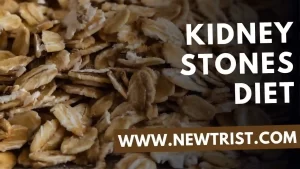
Table of Contents
Kidney Stones
Kidney stones are hard deposits consisting of salts and minerals that clump together inside the kidneys. They are also known as Renal calculi, Nephrolithiasis, or Urolithiasis.
Kidney stones can be formed due to a variety of factors including diet, excess body weight, various medical complications, hereditary factors, and specific supplements.
Kidney stones can be formed in any part of the urinary tract right from the kidneys to the bladder. When the urine becomes concentrated, minerals can crystallize and adhere to one another and leading to the formation of stones.
Kidney Stones Symptoms
Symptoms are typically not present until a kidney stone moves around or enters one of the ureters. The elongated tubes that link the kidneys to the bladder are called ureters.
A kidney stone stuck in the ureters can restrict the urine’s flow, inflame the kidney, and cause the ureter to spasm, all of which can be excruciatingly painful. A person will be able to experience the following signs:
- Severe, stabbing pain below the ribcage on the side and back
- Radiating discomfort in the groin and lower abdomen
- Pain that is intermittent and varies in severity
- When urinating, there may be pain or burning.
Other warning signs and symptoms could be:
- Red, pink, or brown urine
- Cloudy or stench-filled motion
- A constant urge to urinate, urinating more frequently than normal, or urinating infrequently
- Nausea and diarrhea
- If there are an infection, fever, and chills
List Of Foods That Cause Kidney Stones
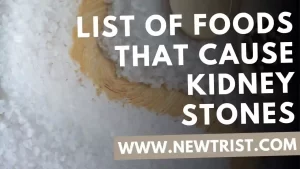
Salt:
Calcium accumulation in the urine can be encouraged by high sodium levels in the body. Avoid seasoning meals with additional salt, and avoid processed items due to their high sodium content.
Both fast food and typical restaurant foods can include a lot of sodium. When you can, request that whatever you order from a menu not be salted. Have an eye on the drink as well.
Certain vegetable juices may contain a lot of mineral salts.
Animal protein:
High-protein foods like red meat, chicken, poultry, seafood, and eggs increase the level of uric acid produced in the body and increase the risk of kidney stones.
Consuming a lot of protein lowers the citrate level in the urine. Citrate hinders the formation of kidney stones. It is better to limit the intake of proteins derived from animal sources.
A high-protein diet lowers urinary citrate levels, a molecule in urine that aids in stone prevention. Limit your meat intake if you are prone to stones. This component is also good for your heart.
Oxalates:
Foods high in oxalates may promote the development of kidney stones. If you’ve already experienced kidney stones, you might want to cut back on or eliminate oxalates from your diet.
Consult a nutritionist to find out what foods to restrict if you are attempting to prevent kidney stones. Always eat or drink a calcium source along with oxalate-containing meals if you do consume them.
Before it reaches the kidneys, the oxalate binds to the calcium during digestion. Among the foods high in oxalate are chocolate, beets, nuts, sweet potatoes, tea, swiss chard, spinach, and rhubarb.
Carbonated drinks:
Steer clear of sodas. Phosphate, another component that may assist the formation of kidney stones, is abundant in carbonated drinks.
Stop consuming additional sugars and syrups that are added to processed foods and beverages. An additional increase in the consumption of fructose and sugar may increase the risk of kidney stones.
Be cautious about your sugar intake that comes from processed meals like cake, fruit, soft drinks, and juices.
Added sugars may be in the form of corn syrup, crystallized fructose, honey, agave nectar, brown rice syrup, and cane sugar.
List Of Foods To Avoid Kidney Stones
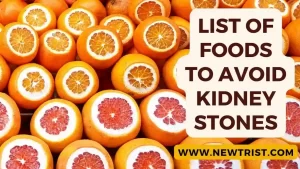
Removal of kidney stones is a painful process. The formation of stones can be prevented by following a healthy diet plan which includes vegetables, fruits, grains, and low-fat dairy products.
- Citrus fruits and juices
- Cereals
- Grains
- Rye bread
- Brussel sprouts
- Kale
- White rice
- Oats
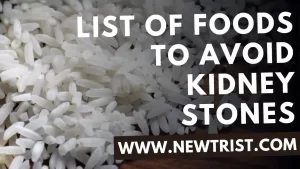
Calcium Oxalate Kidney Stones Diet
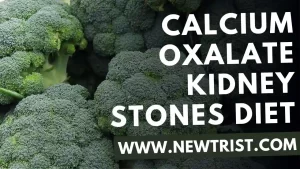
Kidney stones diet for calcium oxalate stones, what foods to take, and what foods to avoid are covered in the below table. Our nutritionist will analyze your health condition and prepare your personalized diet plan.
|
Recommended |
Restricted |
|
Egg whites |
Spinach |
|
Cantaloupe |
Tofu |
|
Poultry |
Nuts and seeds |
|
Milk |
Processed meats |
|
Cheese |
Grits |
|
Low- fat Yogurt |
Miso soup |
|
Fruit juices |
Baked potatoes with skin |
|
Brussel sprouts |
Pumpkin |
|
Kale |
Beets |
|
Broccoli |
Eggplant |
|
Cauliflower |
Chocolates |
|
Rice |
Tomatoes |
|
Oats |
Soy products |
|
Romaine and Iceberg lettuce |
Raspberries |
|
Radishes |
Dates |
|
Garlic |
Cinnamon |
|
Cucumber |
Grapefruit |
Calcium Oxalate Stones Diet
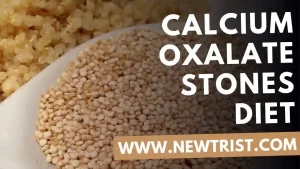
Kidney stones diet menu plan for calcium oxalate stones patient.
|
Morning |
Cereal pulse mix |
|
Breakfast |
Quinoa and chia porridge |
|
Mid-morning/soup |
Vegetable soup |
|
Salad |
Celery salad with apples |
|
Lunch |
Sesame soba wheat noodles |
|
Evening snack |
Soy milk |
|
Dinner |
Vegan burrito bowl |
|
Bedtime |
Valerian Tea |
Calcium Phosphate Kidney Stones Diet
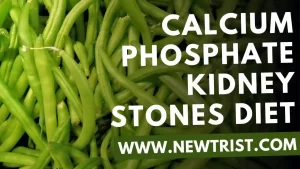
Kidney stones diet for calcium phosphate stones, what foods to take, and what foods to avoid are covered in the below table. Our nutritionist will analyze your health condition and prepare your personalized diet plan.
|
Recommended |
Restricted |
|
Rice |
Nuts and seeds |
|
Eggs |
Wheat bran |
|
Banana |
Spinach |
|
Milk |
Beetroot |
|
Yogurt |
Cola drinks |
|
Pineapple |
Processed foods |
|
Apple cider vinegar |
Organ meats |
|
Fresh Beans |
Foods rich in sodium |
|
Pasta and bread |
Oatmeal |
|
Blueberries |
Buckwheat flour |
|
Soy milk |
Red meats |
|
Unenriched Rice milk |
Peanut butter |
|
Celery |
Avocados |
|
Fish |
Cheese spreads |
|
Corn and rice cereals |
Bottled beverages |
|
Citrus fruits and juices |
Sauces and puddings |
Cystine Kidney Stones Diet
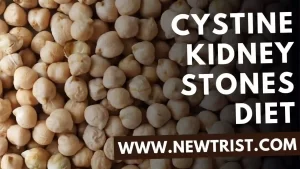
Kidney stones diet for cystine stones, what foods to take, and what foods to avoid are covered in the below table. Our nutritionist will analyze your health condition and prepare your personalized diet plan.
|
Recommended |
Restricted |
|
Rice |
Packed Meats |
|
Nuts and seeds |
Potato chips |
|
Chickpeas |
Canned soup |
|
Broccoli |
Sandwich meats |
|
Carrots |
Sardines |
|
Fruit juices (with zero added sugars) |
Shellfish |
|
Pulses and lentils |
Anchovies |
|
Cabbage |
Poultry and turkey |
|
Eggplant |
Organ meats |
|
Cucumber |
Sugars |
|
Mushroom |
Dairy |
|
Banana |
Grains |
|
Cooked kale |
Brazil nuts |
|
Oats |
Crab and lobster |
|
Tomatoes |
Eggs |
Cystine Stones Diet
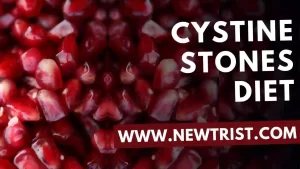
Kidney stones diet menu plan for cyctine stones patient.
|
Morning |
Pomegranate juice |
|
Breakfast |
Mushroom hash with poached egg |
|
Mid-morning/soup |
Salmon soup |
|
Salad |
Quinoa fruit salad |
|
Lunch |
Rice + grilled tofu + dal |
|
Evening snack |
Berry and yogurt smoothie |
|
Dinner |
Caprese Pasta Salad |
|
Bedtime |
Chamomile Tea |
Foods For Uric Acid Kidney Stones
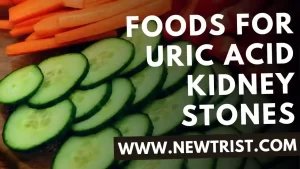
Kidney stones diet for uric acid stones, what foods to take, and what foods to avoid are covered in the below table. Our nutritionist will analyze your health condition and prepare your personalized diet plan.
|
Recommended |
Restricted |
|
Low-fat dairy products |
Red meat |
|
Rice |
Organ meat |
|
Quinoa |
Shellfish |
|
Eggs |
Anchovies |
|
Broccoli |
Sardines |
|
Nuts |
Sugars |
|
Coffee |
Poultry |
|
Brown rice |
Spinach |
|
Oats |
Asparagus |
|
Apples |
Cauliflower |
|
Pears |
Tomatoes |
|
Lemon |
Potatoes |
|
Cucumber |
Codfish |
|
Non-soy legumes |
Turkey |
Uric Acid Stones Diet
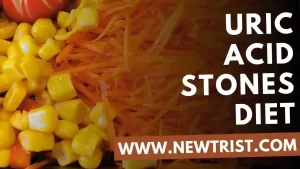
Kidney stones diet menu plan for uric acid stones patient.
|
Morning |
Herbal tea |
|
Breakfast |
Blueberry almond oats |
|
Mid-morning/soup |
Cold Cucumber Soup |
|
Salad |
Classic corn salad |
|
Lunch |
Rice + dried peas fry + Dal |
|
Evening snack |
Vegetarian kebab |
|
Dinner |
Quick tomato basil pasta |
|
Bedtime |
Turmeric milk |
Struvite Stones Foods To Avoid

Eat fewer foods that are high in oxalate. Limit your intake of spinach, berries, chocolate, wheat bran, almonds, beets, tea, and rhubarb from your diet.
Limit your intake of processed foods and salt. High sodium intake may increase the risk of developing kidney stones. A low-sodium diet is crucial for regulating blood pressure.
Steer clear of high vitamin C supplement doses. Excessive intake may cause the body to create more oxalates.
Include a lot of calcium in your diet. Our nutritionist can customize your calcium requirements.
Egg In Kidney Stone

|
Type of Kidney stone |
Is Egg Allowed |
|
Calcium oxalate stone |
Allowed (only egg whites) |
|
Calcium phosphate stone |
Allowed |
|
Uric acid stone |
Allowed |
|
Cystine stone |
Not allowed |
Whole eggs contain calcium, potassium, and phosphorus nutrients that are frequently restricted in renal diets.
The egg white contains the majority of the protein, while the yolk only contains 20% of the egg’s calories from protein compared to the white’s 84%.
A CKD patient may opt for either whole eggs or egg whites depending upon the protein requirements with the flexibility to limit or increase their protein intake.
Whole eggs offer a calorie-dense source of nutrients for CKD patients.
Eggs contain little salt and minerals, that the essential for the formation of stones. Egg white or whole eggs may be used, depending on phosphorus restrictions and the existence of dyslipidemia.
Compared to the white, the yolk contains fat-soluble vitamins, iron, and zinc, helping to meet dietary requirements.
Patients lose protein during dialysis, and CKD patients who are receiving dialysis have higher protein needs.
Is Milk Bad For Kidney Stones
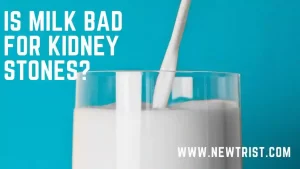
|
Type of Kidney stone |
Is Milk Allowed |
|
Calcium oxalate stone |
Allowed |
|
Calcium phosphate stone |
Allowed |
|
Uric acid stone |
Allowed |
|
Cystine stone |
Not allowed |
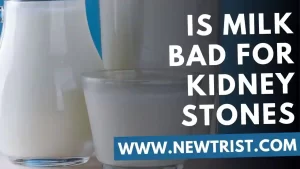
One can prevent or delay the risk of kidney stones by eating foods high in dietary calcium, such as milk, yogurt, cheese, fortified milk substitutes, white beans, tahini, and chia seeds.
The calcium that is derived from the diet binds with the oxalates before it reaches the kidneys assisting in the prevention of the formation of stones.
Kidney stones are not formed due to milk consumption, and it may even prevent them. Hard deposits of minerals and salts called kidney stones to form in the kidneys.
Is Chicken Good For Kidney Stones

|
Type of Kidney stone |
Is Chicken Allowed |
|
Calcium oxalate stone |
Allowed |
|
Calcium phosphate stone |
Not allowed |
|
Uric acid stone |
Not allowed |
|
Cystine stone |
Not allowed |
Numerous protein foods, including red meat, chicken, poultry, and eggs, raise the level of uric acid in your body. This increases the risk of the formation of stones in the kidney.
Eating a lot of protein lowers the level of citrate in urine. Kidney stone formation is something that citrate works to stop. Quinoa, tofu, hummus, chia seeds, and Greek yogurt are other vegetarian protein options.
A high-protein diet lowers urinary citrate levels, a molecule in urine that aids in stone prevention.
Red Meat And Kidney Stones

Red meat and proteins from animal sources are not advisable for any type of kidney stones.
Proteins that are particularly derived from plant sources are necessary for adequate nourishment, and kidney stone disease is influenced by their special characteristics.
High non-dairy animal protein and low-alkaline food intake are regarded to be detrimental to kidney stone formation, leading to
- negative calcium balance
- low pH in the urine
- low citrate
- potassium and magnesium excretions in the urine
Purine metabolism is accelerated by animal proteins, which causes hyperuricosuria in cases of calcium and uric acid nephrolithiasis.
In the presence of mild metabolic hyperoxaluria and idiopathic calcium nephrolithiasis, increasing animal protein intake appears to alter urine oxalate excretion.
The relationship between protein intake and the risk of kidney stones is supported by epidemiological data.
A DASH diet, which is high in vegetables and low in animal proteins, has the lowest risk of incident kidney stones in three sizable prospective cohorts.
Eating a lot of fruits and vegetables and low-fat dairy products could reduce the risk of developing stones by up to 45%.
Vegetables To Avoid For Kidney Stones
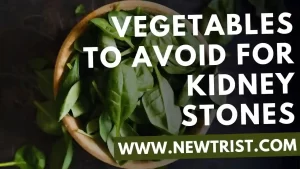
The below vegetables should be avoided for all types of kidney stones.
- Beets
- Cocoa
- Spinach
- Rhubarb
- Swiss chard
- Rhubarb
Some of the high-quality vegetarian options are Quinoa, tofu (bean curd), hummus, chia seeds, and Greek yogurt.
Foods That Trigger Kidney Stones

Foods high in sodium:
Consuming more sodium, which is a component of salt, boosts the level of calcium in your urine and hence increases your chance of developing calcium oxalate and calcium phosphate stones.
Reduce your intake of packaged meats, canned goods, fast meals, and sauces that are packed with lots of sodium.
Foods high in oxalate:
If you’ve had calcium oxalate stones, you should limit your intake of foods high in oxalate. These include spinach, beets, wheat bran, okra, nuts, and nut products.
Oxalate-rich meals and calcium can work together to help your body process oxalate and prevent kidney stones from forming.
Animal protein:
Animal protein may increase the amount of uric acid your body produces even though you need an adequate quantity of protein in your diet every day from sources like poultry, eggs, and fish.
Uric acid kidney stones can form when uric acid levels are too high. To lower the risk of kidney stones, try swapping out animal protein for plant-based proteins such as legumes, soy products, dairy products, etc.
Sugar:
Added or refined sugars can increase your risk of developing kidney stones, heart disease, and other dangerous illnesses.
Sugary beverages can increase urine calcium levels while reducing urine volume.
Eliminate or cut back on sugar or high-fructose, corn syrup, flavored goods, and beverages which can lead to weight gain and an elevated risk of kidney stones.
Consume enough water to better your general health and prevent kidney stones.
